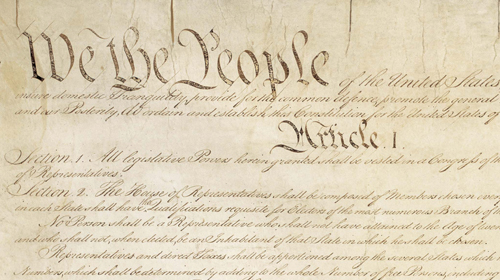
When a hearing is calm and subdued on an issue that has been contentious for seven years, is it news? Maybe - when that issue is Real ID. I blogged last fall about how Real ID was dead and the committee room for today's House Judiciary Committee on Real ID had the atmosphere of a funeral home: quiet, unhurried, with no raised voices or angry emotions. It was sparsely attended both in the audience and among committee members, without a single rank-and-file Republican attending.
Contrast that with the history of Real ID ã states in open rebellion against a federal statute and refusing to comply. Privacy, civil liberties, libertarian and other groups starting websites with names like . Packed hearings from 2009 with vocal debates about repealing the law. So how did we get here and what does it mean?
As background, it's important to understand that Real ID is stalled, as currently constituted. It's a that forces states to conform to one-size-fits-all drivers' licenses rules. At least 15 states have rejected that mandate and the federal government's only solution under the statute is to bar citizens of those states from using their driver's licenses to pass airport security. Since that would bring air travel to a halt, it isn't going to happen. So ã stalemate.
The other key background fact: the Real ID regulations don't actually match the Real ID statute. The regulations ignore key requirements like the need to build a national database of drivers' information. Also the regulations (and Department of Homeland Security [DHS] officials) generally talk about "material compliance" with Real ID ã i.e. general compliance with the law's broad principles rather than its precise provisions.
David Heyman, the DHS official who testified today, said in response to questioning that DHS would judge state compliance by "the totality of what they have done." he says "the security of driver's licenses has been improved in ALL states, even in the 13 states with legislation prohibiting their participation in REAL ID." He also says DHS will be providing further guidance to states shortly. Interestingly, Rep. Jim Sensenbrenner (R-Wisc.), the author of Real ID and its main supporter in Congress, agrees, claiming that states have improved their license security thanks to Real ID.
All of this seems to set the stage for DHS to declare every state materially compliant based on their independent actions to improve security (even the states that have opted out). Given what an embarrassment Real ID has been for DHS, it doesn't seem out of the question. If it happens it will be a net win for privacy; No drivers' license as a national ID card, no national database of drivers' information.
It will be up to all of us to keep pushing remaining issues ã such as protecting electronic documents in storage and safeguarding the address information of domestic violence survivors ã but perhaps this hearing was in fact a wake for Real ID. Rep. Sheila Jackson-Lee (D-Tex.) actually called it a "stalled law ready for burial." Maybe that will be the epitaph on Real ID.
Learn more about Real ID: Sign up for breaking news alerts, , and .

